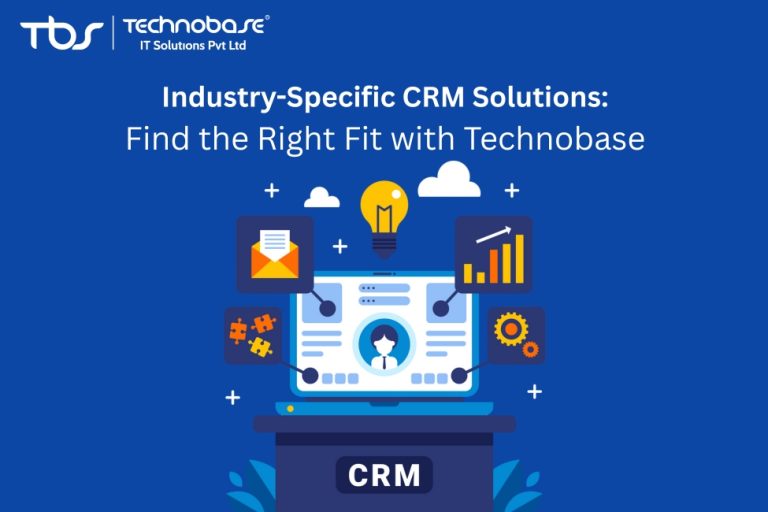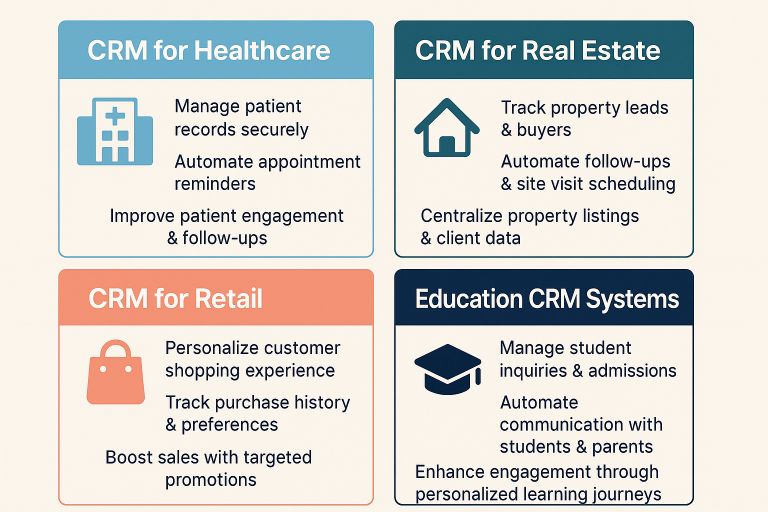Industry-Specific CRM Solutions: Which CRM Fits Your Business?
Customer relationship management (CRM) systems have now developed beyond the one-size-fits-all approach in the competitive business world today. Various industries have different issues, policies, and customer relationship patterns that demand special CRM capabilities. Knowing the CRM that suits your industry needs effectively may save your customers, boost operations and revenue significantly.

Why Industry-Specific CRMs Matter More Than Ever
Generic CRM solutions often fall short when businesses need to address industry-specific workflows, compliance requirements, and customer journey complexities. Healthcare providers need HIPAA compliance, real estate agents require MLS integration, and retail businesses demand inventory management capabilities. The right industry-tailored CRM doesn't just store customer data—it transforms how your business operates within your sector's unique ecosystem.
CRM for Healthcare: Prioritizing Patient Care and Compliance

CRM systems in healthcare should balance between a high standard of care for patients and a high level of regulatory compliance. These dedicated platforms are fully compatible with Electronic Health Records (EHR) systems, ensuring an uninterrupted flow of patient data between departments and compliance with HIPAA requirements.
Among the most prominent healthcare CRM functionalities are appointment scheduling automation, the ability to integrate a patient portal, insurance verification processes, and follow-up sequences. The telehealth integration also means advanced healthcare CRMs can support multilayered consulting and remote patient monitoring.
CRM medical software emphasizes the use of data encryption, audit trails, and role-based access controls. These systems also automatically record every interaction with patients, generating detailed compliance reports that meet the requirements of healthcare audits. Patient consent management features provide that all communications comply with privacy regulations and do not violate the standards of personalized care.
CRM for Real Estate: Managing Complex Sales Cycles
The real estate businessmen or women handle a large number of clients, homes, and deals at a time. Dedicated real estate customer relationship management systems are connected to Multiple Listing Service (MLS) databases, which offer real-time updates on the property and market analytics. These systems are automated lead distribution systems that help in connecting hot leads with available agents the moment they occur.
More sophisticated real estate CRMs also support virtual tours, documenting contracts and disclosures, and commissions. The addition of popular real estate services such as Zillow and Realtor.com facilitates the capture of leads in a variety of locations.
Real estate CRMs are good at handling the long sales process of multiple stakeholders. It also features timeline management of closing processes, automated milestone recommendations, and coordination tools with lenders, inspectors, and title companies. Mobile optimization so that agents can access important information when showing the property and when sitting with clients.
CRM for Retail: Enhancing Customer Experience and Inventory Management
Contemporary retail CRMs are based on a single platform that coordinates engagement between customers and online retailers, brick-and-mortar stores, social networks, and mobile applications. Such systems provide detailed customer profiles that involve both purchase history, browsing history, preference information, and engagement behaviors related to all touchpoints.
The retail specifics are the implementation of loyalty programs, automated abandoned cart recovery, and automated product recommendations. High-pressure retail CRMs use artificial intelligence to forecast customer lifetime value and opportunities that can be upsold.
CRM systems used by retailers easily combine with point-of-sale and inventory control systems. On-demand visibility of stock levels helps in avoiding the overselling of products, as automated reorder messages help in keeping the inventory at the optimum level. Performance analytics on sales identify the products on a trending basis and seasonal trends.
Industry-Specific Features That Drive Results
Manufacturing companies need CRMs overseeing complicated business-to-business connections, lengthy purchase phases, and technical product designs. These can be bi-directional quote generation, including technical drawings, supplier relationship management, and production timeline integration. These systems usually have custom manufacturing order project management tools.
Compliance with regulations, risk evaluation, and client portfolio management are the key aspects of financial CRM. The main characteristics are tracking investment, automation of regulatory reporting, and secure client communication portals that are secure. The advisor workflows are simplified with integration to financial planning software and trading platforms.
Educational institutions require a CRM that handles the student lifecycle between inquiry and alumni management. These systems involve automation of the workflow in admissions, monitoring student success, and fundraising campaign management. Learning management systems integration gives detailed student feedback.
Which CRM to implement in your industry?
When making decisions on an industry-related CRM, you should always keep in mind your own processes, regulatory requirements, and future growth goals. It is best to first identify the most basic compliance requirements for your industry, the integrations with your existing systems, and process challenges.
Weigh the scalability considerations, since the CRM you select must be able to support business expansion without having to undergo wholesale system reengineering. The quality of vendor support and experience in the industry domain can have a strong influence on the success of implementation and satisfaction in the long term.
The effective use of CRM requires a smooth integration with available business tools and thorough training of the team personnel. A CRM with an industry focus may need a specific configuration and customization in order to be used to its full potential. Arrange sufficient training time and continuous support for the adoption of the user and system optimization.
How to Make the Right CRM Choice to Maximize ROI.
CRM based on industry offers better ROI since it will cater to industry-specific issues, which a generic solution is not able to cater to effectively. These specialized systems minimize the number of manual procedures, increase compliance adherence, and elevate customer satisfaction based on customized experiences.
The success of CRM is in selecting a solution that can satisfy the current demand and predict the future of the industry and regulatory requirements. When you hire qualified CRM consultants, you know your investment will pay off in terms of quantifiable business benefits and competitive edge.
Willing to change how you relate with your customers using the most industry-specific CRM solution? Get in touch with Technobase IT Solutions and get professional advice on choosing and adopting the CRM that best suits your industry needs. As a company, we have been in the business of aligning businesses with CRM solutions that can help them grow, become more efficient, and deliver quality customer experiences. We can also assist you in finding out how you can transform your business through the appropriate CRM.
